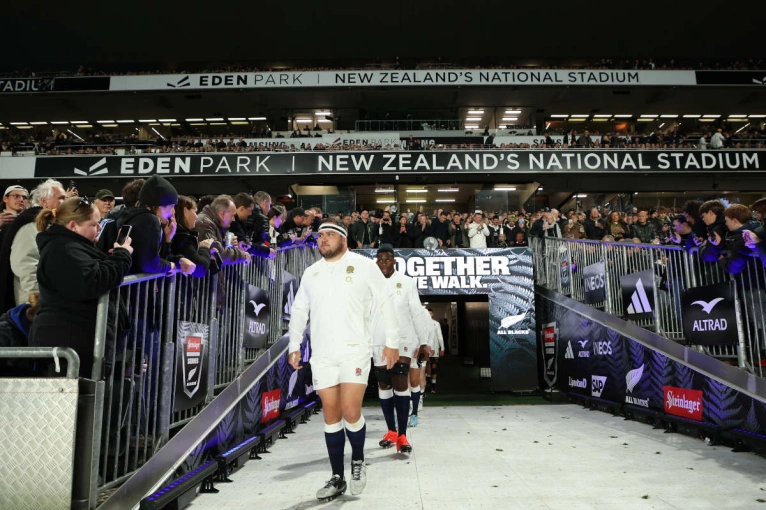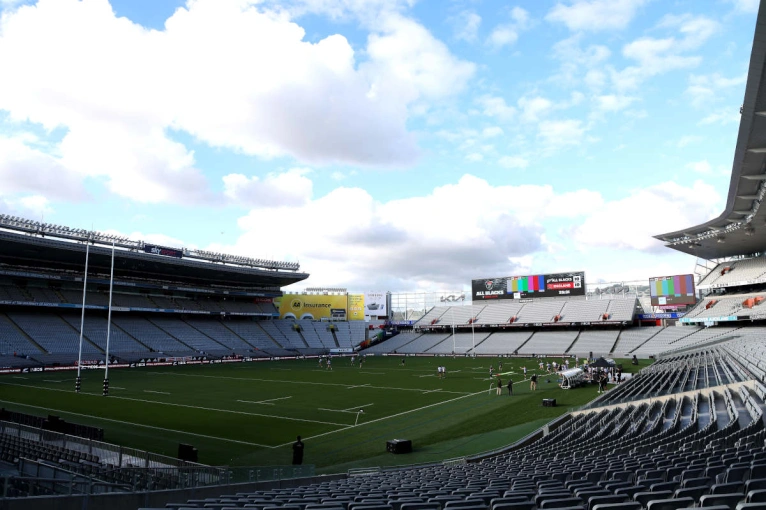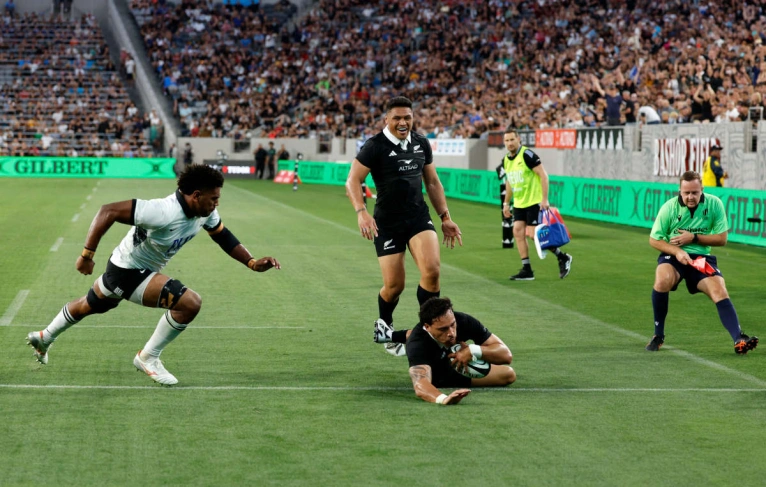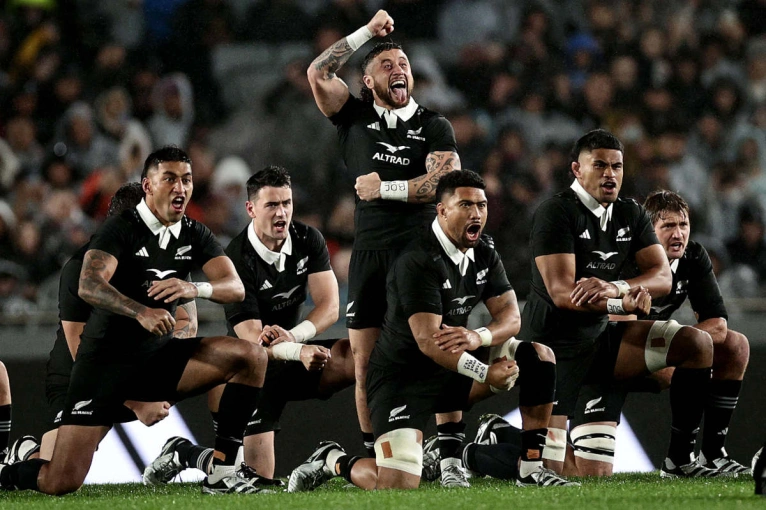This week, the All Blacks will put their incredible 31-year, 50-Test unbeaten streak on the line when they play the Springboks at Eden Park.
It will be one of the toughest challenges the All Blacks have faced in preserving their record at the Auckland ground that stretches back to 1994, when the French, in the way only the French could, scored the so-called ‘try from the end of the earth’ to be the last visiting team to win there.
Eden Park, which self-styles itself as New Zealand’s national stadium, has become the All Blacks’ spiritual home, their happy place where home fans turn up with almost zero comprehension that it’s possible their team could lose.
The All Blacks have won a World Cup at Eden Park as part of their current unbeaten run, equalled the world record (for top-tier nations) of 18 consecutive Test victories – against Australia in 2016 – there, and beaten every top-10 team at their treasured ground at least once.
 Raucous scenes greeted New Zealand’s first RWC triumph in 24 years in 2011. They played five matches at Eden Park during the tournament (Photo Phil Walter/Getty Images)
Raucous scenes greeted New Zealand’s first RWC triumph in 24 years in 2011. They played five matches at Eden Park during the tournament (Photo Phil Walter/Getty Images)
But this will be the first time since 2004 – when they took on England – that the All Blacks have faced a reigning world champion at Eden Park.
They never faced the Boks at Eden Park between 2007 and 2011, and while they were scheduled to play their old foe there in 2021, in what was the 100th Test between the two nations – the game was shifted to Townsville because of the Covid pandemic.
This is a big one, then, made yet more tense for New Zealanders by the fact the All Blacks have lost their last four Tests against the Boks, and are yet to post a victory against them under coach Scott Robertson.
The stadium may be where the All Blacks are most successful, but it is not a venue that is loved by New Zealand Rugby, and not a ground it particularly wants to schedule more Tests at.
When asked to explain what makes Eden Park such a special ground for the All Blacks, Robertson spoke about “the deeds that have been shown on it”.
“The amount of honour and respect that has been shown each time we have run out there has added to that legacy and every team has got an opportunity to add to that, and ours is this week,” he added.
But there is another narrative playing out which is seemingly at odds with this idea that Eden Park is the All Blacks’ spiritual home.
The stadium may be where the All Blacks are most successful, but it is not a venue that is loved by New Zealand Rugby, and not a ground it particularly wants to schedule more Tests at.
 Eden Park has been a graveyard for visiting teams with only South Africa (in 1994) and the Lions (2017) emerging with draws since New Zealand’s last defeat there (Photo Phil Walter/Getty Images)
Eden Park has been a graveyard for visiting teams with only South Africa (in 1994) and the Lions (2017) emerging with draws since New Zealand’s last defeat there (Photo Phil Walter/Getty Images)
Last year, Auckland’s Mayor Wayne Brown said he wanted to finally give the city a cohesive stadium strategy after decades of ad hoc, non-sensical decision-making.
As part of that, he wanted a definitive answer on the feasibility of investing the estimated $600 million-plus required to upgrade Eden Park into a modern, fit-for-purpose venue, or whether there were alternative greenfield sites that would be better suited to house a new stadium.
The answer to that question remains no clearer now than it did when the process started, but it was a process that saw NZR endorse a proposed new stadium on Auckland’s waterfront.
It was a surprise that the union would throw its name behind a new venture and not support the ground where New Zealand have been so successful.
Eden Park is easily the largest stadium in the country, and according to NZR it yields around 70 per cent less revenue per match than the Aviva Stadium in Dublin, despite having roughly the same capacity.
A surprise because it highlighted how much NZR is willing to let its commercial goals determine where the All Blacks play.
It backed a new stadium in Auckland for the simple reason it would have a bigger capacity than Eden Park’s 45,000 (that can increase to 50,000 with temporary seats) and yield much greater financial returns.
And this is the nub of the issue for NZR. It is on a mission to double its revenue over the next seven years, but unlike England, Ireland, Wales and Scotland, who own their stadiums, Test matches don’t bring in big money.
Eden Park is easily the largest stadium in the country, and according to NZR it yields around 70 per cent less revenue per match than the Aviva Stadium in Dublin, despite having roughly the same capacity.
 A proposed staged upgrade of Eden Park was endorsed by Auckland Council earlier this year but it also found the whole project was “not currently financially feasible” (Photo Phil Walter/Getty Images)
A proposed staged upgrade of Eden Park was endorsed by Auckland Council earlier this year but it also found the whole project was “not currently financially feasible” (Photo Phil Walter/Getty Images)
New Zealand’s other stadiums – Westpac in Wellington (33,000), Forsyth Barr in Dunedin (29,000), FMG in Hamilton (21,000) and the new-build in Christchurch that will open next year (30,000) – bring in even less dollars.
These limited financial returns mean there is a dichotomy of Eden Park being the ground where the All Blacks are most likely to win and enhance their legacy, but NZR being more open to the idea of taking home Tests offshore in search of more income.
The statistics are building to show how the decision-making about where the All Backs play is changing. It is best illustrated by the fact there will be a 25% reduction in home Tests in the 2020-2027 period when compared with 2012-2019.
In the two World Cup cycles from 2012-2019, the All Blacks played 44 Tests in New Zealand, but it is now likely (some scheduling is not yet finalised) that there will be just 33 (but maybe fewer) home Tests played between 2020 and 2027.
NZR is making choices to take the All Blacks out of New Zealand in search of more money and with a wider aim of growing the brand in emerging rugby markets – particularly Japan and the USA.
Some of this reduction is due to the impact of Covid which saw the Rugby Championship played entirely in Australia in both 2020 and 2021, but some of it is because NZR is making choices to take the All Blacks out of New Zealand in search of more money and with a wider aim of growing the brand in emerging rugby markets – particularly Japan and the USA.
In the 2020-2027 period, the All Blacks will play in the US three times and Japan twice, and (excluding the Covid years of 2020 and 2021) at least four, possibly five “home” Tests will not be played in New Zealand but be taken offshore.
Last year, the All Blacks played what should have been a home fixture (in Hamilton) against Fiji in San Diego and next year they will forfeit playing in the Rugby Championship to instead tour South Africa, where they will play four Tests, one of which will probably be in Europe.
NZR also considered playing its home Bledisloe Test against Australia next year in the US – possibly in New Orleans or Miami.
 In July 2024 the All Blacks played Fiji in a ‘home’ Test in San Diego, California (Photo Kevork Djansezian/Getty Images)
In July 2024 the All Blacks played Fiji in a ‘home’ Test in San Diego, California (Photo Kevork Djansezian/Getty Images)
The stats get more revealing when the overall mix is considered, with the All Blacks destined to play just four of 13 Tests at home in 2026 and that just 34% of all Test matches played between 2020 and 2027 will take place on home soil (on the assumption the All Blacks make it to the last four of the 2027 World Cup).
In the period from 2012 to 2019, they played 41% of their Tests at home and in the World Cup cycle before that (2008-2011), they played 54% of their games at home, although the number is skewed because the 2011 World Cup was hosted by New Zealand.
This is impacting heavily on how often the All Blacks play at Eden Park, too. In 2012-2019 they played there 14 times, and so far between 2020 and 2025 they have played there just seven times (the scheduling for 2026 and 2027 is not confirmed but the drop in games played in Auckland is going to be significant).
So maybe it’s not a surprise that the All Blacks won 87 per cent of their games between 2012 and 2019 when they were playing more at home, and more at Eden Park.
Since 2020, they have had a 70 per cent success ratio, a figure that is perhaps influenced by playing fewer games at home and fewer at Eden Park.
To put it into perspective, the per-head spend in San Diego was six times higher than it is at Eden Park
But NZR, which is on a mission to double its $270m of revenue over the next seven years, is unapologetic. Yarnie Guthrie, general manager of the union’s commercial arm, explains why playing more outside of New Zealand is going to continue.
“The job to do in Japan and North America is to create more rugby content,” he says. “We get our teams playing in those markets with a bit more regularity to enable them to brand-build in a meaningful way.
“We signed a MoU [memorandum of understanding] with the Japan Rugby Union a few years ago and that has seen our teams – the Maori All Blacks, the All Blacks XV or the All Blacks – playing there on rotation.
“And we are looking to create a similar structure as we head towards the 2031 World Cup in America. It probably won’t be with the same regularity, but it is important to have a presence and the Chicago match at the end of this year [against Ireland] is an example.
“That match sold out in two or three days. That just shows the interest. And the big benefits if you get it right.”
 The All Blacks last performed at Eden Park in last year’s Rugby Championship Test against Argentina (Photo Dave Rowland/Getty Images)
The All Blacks last performed at Eden Park in last year’s Rugby Championship Test against Argentina (Photo Dave Rowland/Getty Images)
The ticket revenue and match-day income NZR took from the game against Fiji in San Diego last year and the likely return from playing Ireland in Chicago this year, is believed to be around 20%-30% more than it receives from playing at Eden Park.
But the kicker is the additional amounts of cash that can be made from merchandise sales. “To put it into perspective, the per-head spend in San Diego was six times higher than it is at Eden Park,” Guthrie adds.
“In Tokyo, it was four-and-a-half-times and the only reason it wasn’t more – it could have been 10 times – was we only had one store and there were queues for 2km to get into the merchandise store at the stadium.
“We just need to have a ‘build it and they will come’ mentality because if we had six stores operating, they probably would have been all full.”

